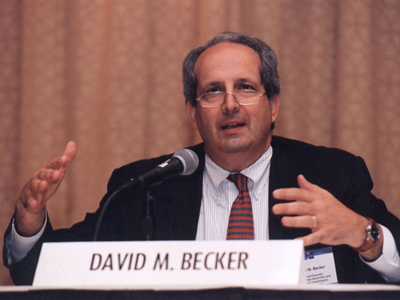SEC’s Becker/Madoff saga: How could it smell worse?
The announcement on Monday Former SEC Counsel Rejoins Cleary Gottlieb Amid Madoff Scrutiny by Joshua Gallu (Bloomberg May 9, 2011) pretty much settles the matter: former General Counsel David Becker’s departure from the Agency was hasty and unplanned. Becker had been unemployed since the end of February: no professional living by generating hourly fees would normally permit such a gap.
As I have previously noted, Becker was recruited to the Agency in February 2009 by incoming Chairwoman Mary Schapiro — who herself got her job as a direct consequence of the Madoff fiasco which had shattered the reputation of the SEC the previous December. The following month, in a meeting with Schapiro and whistleblower Harry Markopolos, Becker
picked a quarrel over extraneous trivia and threw a tantrum so violent that Markopolos’ lawyer “thought that he was about to come right over that table and go for my throat” (Markopolos, 249). Consequently, the meeting was terminated
See Is the Madoff Scandal Paradigmatic? In this essay, Kevin Macdonald and I suggested this was another example of the typically lethal Jewish response to those deemed to have been instrumental (however innocently) in harming Jewish interests. We cited the notorious Cliff Robertson blacklisting: and Professor Macdonald has subsequently reported another. However, it turned out that David Becker had a more personal motive: a few days after the abrupt February 1st announcement of his departure he and his two brothers were sued by the Madoff trustee for some $1.545 million of the $2.045 million Madoff account they inherited from their mother in 2004 and liquidated the following year. While he claimed not to know this was happening, the suit was filed in late 2010 and it is inconceivable that the Trustee did not try to settle before litigating. It rapidly became clear that few if any of his colleagues with whom he dealt on Madoff matters had any idea that Becker had such an involvement.
House Republicans thought it so odd they got Mary Schapiro to testify about it (Becker refused to testify and was not subpoenaed). In her testimony, Schapiro essentially threw Becker to the wolves. She maintained his key defensive assertions but
testified that she relied on Becker, an experienced lawyer, to handle any ethical issues after he told her about the account in 2009. “Do I wish now that he had been more sensitive to the potential of this issue to raise an appearance of a conflict? Yes, I wish it hadn’t happened,” Shapiro said. “I wish that Mr. Becker had recused himself, absolutely,” she added. (SEC chairman: Former general counsel should not have worked on Madoff fallout By David S. Hilzenrath The Washington Post March 10, 2011)
Enterprising journalists dug up far worse:
While the agency had agreed on a deal that would return to investors only the money they had put into their Madoff accounts, Mr. Becker argued that the commission should change its stance to allow victims to keep some of the gains their investments had generated, since the investment would have grown somewhat over time even in a low-interest account. The Becker family would benefit from the approach (The New York Times Times Topic: Securities and Exchange Commission May 4 2011)
The Reuters version of this, Some SEC officials in dark on lawyer’s Madoff link by Sarah N. Lynch Wed Mar 9, 2010:
People familiar with the matter say Becker was involved in advocating a change which would benefit longer-term Madoff investors by adjusting the payments to account for inflation. That refined method was a source of internal dissent within SEC staff. When it came time to vote on it, however, there was no mention of Becker’s conflict, sources said, and the SEC commissioners voted to accept the new recommendation.
It tellingly adds
If this was HP or IBM or some company like that, there is clear law that says they have a fiduciary obligation to share that information. It’s not hard to move from that analogy to the commissioners,” said James Cox, a professor at Duke University School of Law. He added that if Schapiro knew of Becker’s potential conflict, she “had a duty to share it with everybody else. There’s no doubt about it.”
Of course, the Becker story is just a sidebar in the Madoff affair. But it is a significant sidebar. Why on earth did Becker expose himself in this way, for only $500,000? And why did Mary Schapiro bring him in, if he really did tell her about the conflict? After his disgraceful behavior to Markopolos (which was in March 2009) she must have known he was weird on the matter. Why was she taking this risk? Did they both simply consider themselves exempt? In our essay, Kevin MacDonald and I concluded:
the Madoff scandal has the potential to illuminate the economic and political prerogatives usurped in late 20th-century America by what can only be described as the new ruling class.
This is proving true.






Comments are closed.